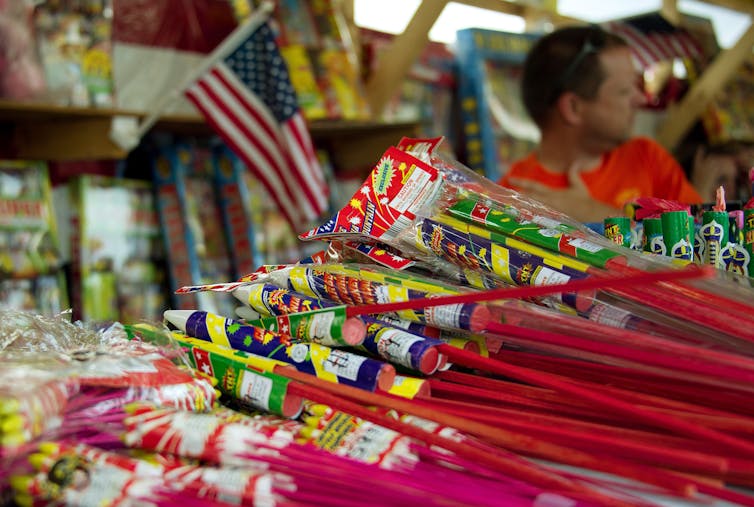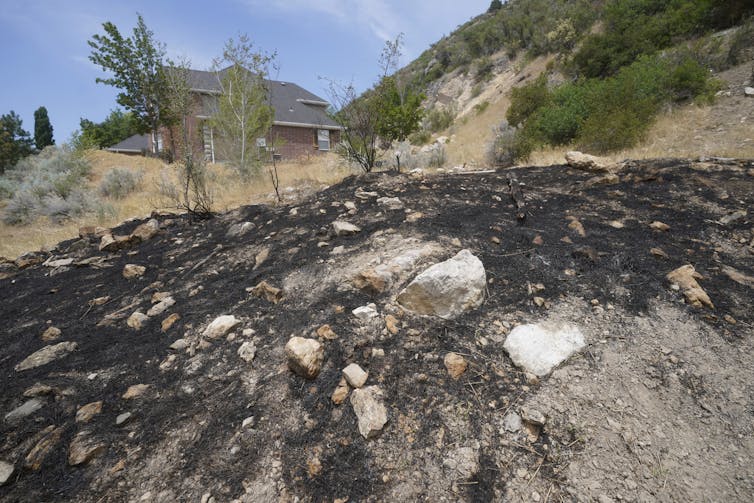Skip the fireworks this record-dry 4th of July, over 150 wildfire scientists urge the US West
 In heat and drought like the western U.S. and Canada are experiencing in 2021, all it takes is a spark to start a wildfire.
Jim Watson/Getty Images
Philip Higuera, The University of Montana; Alexander L. Metcalf, The University of Montana; Dave McWethy, Montana State University, and Jennifer Balch, University of Colorado Boulder
In heat and drought like the western U.S. and Canada are experiencing in 2021, all it takes is a spark to start a wildfire.
Jim Watson/Getty Images
Philip Higuera, The University of Montana; Alexander L. Metcalf, The University of Montana; Dave McWethy, Montana State University, and Jennifer Balch, University of Colorado Boulder
The heat wave hitting the northwestern U.S. and Canada has been shattering records, with temperatures 30 degrees Fahrenheit or more above normal. With drought already gripping the West, the intense heat has helped suck even more moisture from millions of acres of forests and grasslands, bringing dead vegetation in many regions to record-dry levels and elevating the fire danger to its highest categories.
With this combination of extreme drought, heat and dry vegetation, all it takes is a spark to ignite a wildfire.
That’s why over 150 fire scientists, including us, along with fire officials across the West, are urging people to skip the fireworks this Fourth of July and to avoid other activities that could start a blaze.
Humans start the most wildfires on July Fourth
For decades, one of the most striking and predictable patterns of human behavior in the western U.S. has been people accidentally starting fires on the Fourth of July. From 1992 to 2015, more than 7,000 wildfires started in the U.S. on July 4 – the most wildfires ignited on any day during the year. And most of these are near homes.
With this year’s tinder-dry grasslands and parched forests, sparks from anything – a cigarette, a campfire, a power line, even a mower blade hitting a rock – could ignite a wildfire, with deadly consequences.
Year-round, humans extend the fire season by igniting fires when and where lightning is rare. And it is these very fires that pose the greatest threat to lives and homes: Over 95% of the wildfires that threatened homes in recent decades were started by people. Farther from human development – beyond the “wildland-urban interface” – the majority of area burned by wildfires in the West is still due to lightning.
Whether ignited by people or lightning, human-caused climate change is making fires easier to start and grow larger due to increasingly warm, dry conditions. The western U.S. saw these consequences during 2020’s record fire season – and the 2021 fire season has the ingredients to be just as devastating.
Here’s how to stay safe
We’ve spent years studying the causes and impacts of wildfires across North America and around the globe, and working with managers and citizens to envision how best to adapt to our increasingly flammable world. We’ve outlined strategies to manage flammable landscapes and thought carefully about how communities can become more resilient to wildfires.
When asked “What can we do?” many of our suggestions require long-term investments and political will. But there are things you can do right now to make a difference and potentially save lives.
Around your home, move flammable materials like dried leaves and needles, gas and propane containers and firewood away from all structures. Clean out your gutters. If you tow a trailer, make sure the chains don’t hang so low that they could hit the pavement and cause a spark. If you have to mow a lawn, do it in the cooler, wetter morning hours to prevent accidental sparks from igniting fires in dry grass. Don’t drop cigarette butts on the ground.
 Fireworks sparked a wildfire near homes in Provo, Utah, on June 22, 2021.
AP Photo/Rick Bowmer
Fireworks sparked a wildfire near homes in Provo, Utah, on June 22, 2021.
AP Photo/Rick Bowmer
This Fourth of July, skip the fireworks and campfires – instead, catch a laser light show, make s’mores in the microwave and celebrate by keeping summer skies smoke-free for as long as possible.
Many communities are banning personal and public fireworks and voluntarily canceling fireworks displays because of wildfire concerns.
Adapting to increasingly uncharted territory
The fingerprints of human-caused climate change are all over the current drought, the recent heat waves, and what could become another record-setting fire season. Research highlights how human-caused climate change increases the frequency and magnitude of extreme events, including drought, wildfire activity and even individual extreme fire seasons.
Adapting to longer, more intense fire seasons will require reconsidering some traditions and activities. As you celebrate this Fourth of July, stay safe and help out the firefighters, your neighbors and yourself by preventing accidental wildfires.
This article was updated July 1, 2021, with more scientists joining.
[Understand new developments in science, health and technology, each week. Subscribe to The Conversation’s science newsletter.]
Philip Higuera, Professor of Fire Ecology and Paleoecology, The University of Montana; Alexander L. Metcalf, Associate Professor of Human Dimensions of Natural Resources, The University of Montana; Dave McWethy, Associate professor of Earth Sciences, Montana State University, and Jennifer Balch, Associate Professor of Geography and Director, Earth Lab, University of Colorado Boulder
This article is republished from The Conversation under a Creative Commons license. Read the original article.